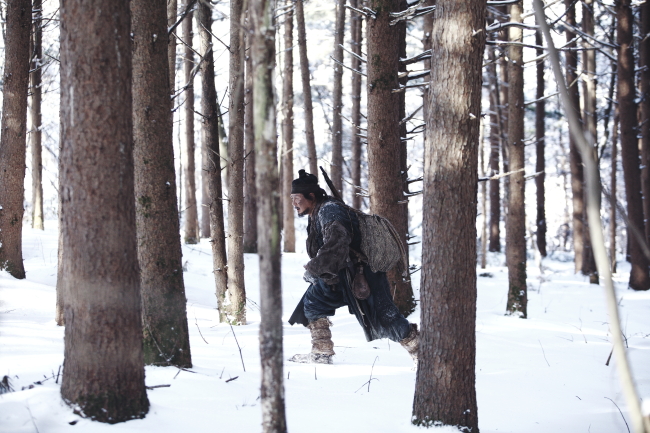“New World” screenwriter and director Park Hoon-jung brings his brooding, solemn style to “The Tiger,” which uses the rough terrain of Mount Jirisan and the weathered face of veteran actor Choi Min-sik to unfold the story of “Joseon’s last tiger.”
The film is a technical triumph. Thanks to the reunion of the production staff from “New World,” the actors give strong performances, the music is stirring, the lensing is carefully controlled and, most importantly, the computer-generated tiger turned out terrific. However, the plot lacks fluidity, with too many subplots that do not mesh together well.
At a press conference Tuesday ahead of the film’s opening, director Park said he wanted to talk about “the people, the nature and the animals” of the Japanese colonial era through a story about “Joseon’s last tiger, and Joseon’s last tiger hunter.”
“The tigers, the hunters who pursued the tigers and lived a traditional way of life, the traditional Korean value system -- all these things disappeared abruptly during the Japanese colonial era. That is what the film is about.”
If that sounds like too much to pack into one film, that’s because it is.
 |
Still from "The Tiger" (NEW) |
Park spends 139 minutes trying to weave together the subplots of hunter Man-duk’s (Choi Min-shik) history with Mount Jirisan’s most elusive tiger, Man-duk’s relationship with his son Seok (Sung Yu-bin), the falling-out between Man-duk and another hunter Gu-gyeong (Jung Man-sik), the ambitions of Joseon-born Japanese soldier Ryu (Jung Suk-won) and the hunt for the titular tiger pushed by the Japanese commander (Ren Osugi), who sees tiger skins as a symbol of his own power.
Each one of those subplots has a completely different ambience, leaving the film switching constantly between adventure, thriller, drama and vaguely fantastical elements.
Lead actor Choi said that despite the physical difficulties of the role (it’s almost painful to watch the actor crawling up the snowy mountainside to find the tiger), he agreed to do the film because he was allured by “how people felt about the mountains, about nature and life back then.”
Choi embodies those ideas in his own character, infusing Man-duk with an almost religious reverence for nature and the mountains. Unfortunately, that vibe does not carry over to the rest of the cast or plot, making his scenes feel isolated and distant.
“The Tiger” could have been so much more if it had left more on the editing room floor. It is still excellently made and worth watching, if only to appreciate the mechanisms of the film, but one can’t shake the lingering feeling of disappointment.
By Won Ho-jung (
hjwon@heraldcorp.com)








